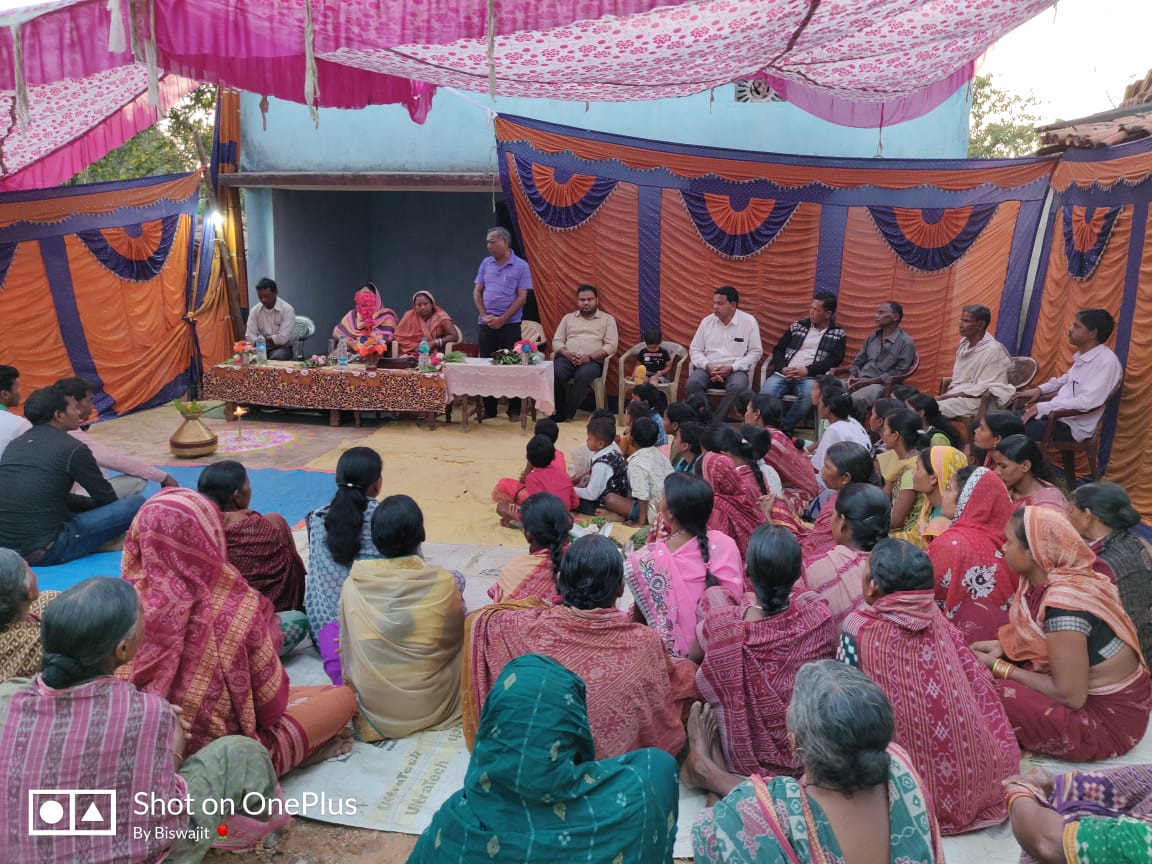Village institutions ensure sustainability of outcomes
StoryBy Chandrika Patnaik
18 March 2020
Gram Vikas’ continuous work in strengthening village institutional platforms has resulted in sustainability of water and sanitation infrastructure, governance, and outcomes in rural Odisha and Jharkhand.

A Village Water Sanitation Committee meeting in progress in Colonypada village of Jharsuguda district.
Photograph by Arjun Singh
Strengthening village-level institutional platforms is a core feature of Gram Vikas’ work. We see communities as equal partners in any work that we undertake in the villages.
A case in point is the 28 household village of Colonypada village in Jharsuguda district of Odisha. In 2014, with support from Gram Vikas, the village community completed the construction of toilet and bathrooms (TBR) connected with three piped water connections for every household. The onus of maintaining this system lies with the Village Water and Sanitation Committee (VWSC) made of ten members. The VWSC also shoulders the responsibility of cleaning the 20,000 litre overhead water tank once in a year.
The committee maintains a corpus fund of ₹30,000 mobilised through contributions from each household after the completion of TBR and piped water system. The contribution also demonstrated the villager’s collective will to enable a stronger self-governance. The VWSC has opened a bank account to create a maintenance fund for the operational cost of the piped water system. Each household contributes ₹100 per month for the same.
In 2019, the VWSC observed that the TBRs in 22 homes needed some repair work. Ashok Adha, the president of the VWSC recalled how the families were hesitant to bear the repairing cost. The VWSC prepared an estimate, convinced the households of the need to maintain quality of the system for sustainability and collected ₹3,000 for the repair. The work was done without either touching the corpus fund.
In March 2020, a General Body Meeting (GBM) of the VWSC was organised in Colonypada. Sixty people attended the meeting including members of various village committees, such as Self-help Groups (SHGs), Panchayat Samiti, elected members of the Panchayat Raj Institutions and a male and female member from each household. All the attendees conducted a rigorous review of different development works undertaken by the VWSC in the past one year including collections received towards the maintenance fund, future work planned by the VWSC, strategies for its successful execution, and records of income and expenditure. The idea behind such a review was to maintain transparency about the activities conducted by the VWSC and gain the trust of villagers for the workings of VWSC.
Ashok Adha is appreciative of the collaborative approach Gram Vikas adopted to get all households involved in the construction of TBRs and the piped water system. He also acknowledges how Gram Vikas helped to put in place the upkeep-system for the maintenance of TBRs and the piped water system. Today, the participative management and spirit of community ownership fostered by the VWSC have ensured the sustainability of TBRs and the piped water system in Colonypada.
The community water tank in Colonypada village, Jharsuguda district.
Photograph by Sibaram Sahu
ACKNOWLEDGEMENT
Sibaram Sahu supported the data collection. Priya Pillai edited the story.
ABOUT THE AUTHOR
Chandrika Patnaik is Junior Manager with Gram Vikas.
RELATED BLOGPOSTS
Water ushers in a new dawn in the life of Raidih’s farmers
Raidih’s farmers embrace sustainable agriculture and irrigation advancements, heralding a prosperous, water-efficient era in farming.
Gajendra Sahu’s kitchen dreams find wings in his village Adri
Gajendra Sahu transforms his culinary skills into a thriving village enterprise, inspiring Adri’s youth.
From one farmer’s soil to another: how Lochan’s journey in Odisha can inspire us all
Discover how pointed gourd farming reshaped the future for a small-scale farmer in Odisha.